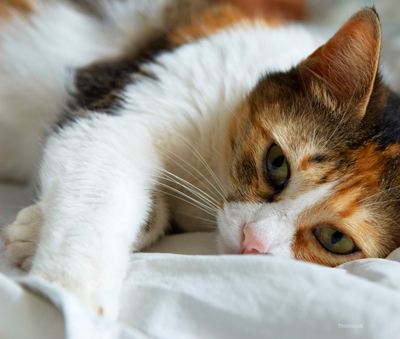Like people, our feline friends can develop allergies. This happens when their immune systems become sensitive to substances present in their surroundings. Known as allergens, these irritating substances may not bother you or other animals in your home, but as your cat’s body tries to get rid of the offending substances, he might show all kinds of symptoms.
Because there is such a wide variety of allergens, cat allergies are generally divided into 3 main categories: flea allergy, environmental allergies (atopic dermatitis), and food allergy. Flea allergy and environmental allergies – the ones that cause “hay fever” symptoms in humans – are the most common. However, cats often have multiple allergies, so a thorough examination by your veterinarian or veterinary dermatologist is recommended.
Symptoms
Allergic kitties are often very itchy and have skin problems associated with allergic dermatitis. They also might exhibit some of these symptoms:
- Sneezing, coughing, and wheezing – especially if the cat has asthma
- Itchy, runny eyes
- Ear infections
- Vomiting or diarrhea
- Snoring caused by an inflamed throat
- Paw chewing or swollen, sensitive paws
There are a variety of allergens that cause these symptoms:
- Pollen, grass, plants, mold, mildew, and other organic substances
- Food
- Perfumes and colognes
- Fleas or flea-control products
- Household cleaning products
- Prescription drugs
- Some cat litters
Gastrointestinal symptoms usually accompany a food allergy, so it is important to avoid feeding your cat food to which he or she has a known allergy. Also, allergies tend to be more common among outdoor cats because they are exposed to a wider range of potential allergens, especially from plants and organic matter.
Diagnosis
If something appears to be making your kitty miserable, the best thing to do is pay your veterinarian a visit. He or she will initially do a complete history and physical exam for your cat to determine the source of the allergies.
history and physical exam for your cat to determine the source of the allergies.
If your vet suspects your cat has allergies, he might want to perform blood tests or experiment with your kitty’s diet to narrow down the cause. Or, if your vet thinks your cat has a skin allergy, your cat might be referred to a veterinary dermatologist.
Treatment & Prevention
The best way to treat your cat’s allergies is to remove the allergens from his or her environment. For instance, if your cat’s allergies are caused by fleas, using veterinarian-recommended flea and tick preventatives can eliminate the cause. If the problem is cat litter, substituting your normal litter for a dust-free alternative could do the trick. In fact, this might help correct a bigger problem if your cat’s been missing his or her litter box.
When it comes to pollen, fungus, mold, or dust, bathing your cat a couple of times per week can help alleviate itching. Your veterinarian can recommend an appropriate shampoo to help you avoid drying out your cat’s skin.
A diagnosis of food allergies may require you to provide your cat with a prescription diet or even home-cooked meals free of the offending allergens. Your veterinarian will provide recommendations as to the best course of action. It is possible that your cat will need dietary supplements to ensure he gets all the vital nutrients he needs.
Medication
Medication is sometimes prescribed for cats in case certain allergens cannot be removed from the environment. Medications include:
- Cortisone, steroids or allergy injections for airborne pollens
- Antihistamines as a preventative
- Flea prevention products
How do allergies affect asthma?
If your cat is allergic to environmental pollutants, it may worsen your cat’s asthma. In this case, your vet may prescribe medications that open your cat’s airway for the short-term; long term solutions include corticosteroids. And here’s a good reminder: cigarette smoke is bad for your cat, especially if your cat has asthma.
If you have any questions or concerns, you should always visit or call your veterinarian – they are your best resource to ensure the health and well-being of your pets.
